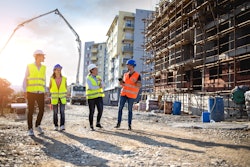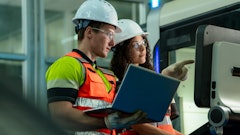
During the past five years, Diversity, Equity, and Inclusion (DE&I) programs have become crucial for fostering non-discriminatory corporate cultures that welcome all individuals. While many construction companies have adopted DE&I policies and strategies, true progress comes from integrating these principles into daily operations. Beyond mere statements, DE&I must be ingrained in how businesses function and turning theory into action.
Create an Inclusive Culture
Creating a supportive culture beyond hiring involves implementing other various initiatives. One of the best ways a team can build an inclusive environment is by encouraging DE&I training up and down the organization. This shows that the company, leadership, and managers promote an inclusive and varied workplace. One that not only meets the criteria of the short-term goals of diversity but supports future growth by also focusing on retention and opportunities for career development.
Construction firms also must take proactive steps to create an equitable environment by prioritizing open communication and active employee listening to ensure varied perspectives are valued and heard. By providing platforms for dialogue, such as town halls and anonymous suggestion boxes, individuals feel empowered to express their opinions freely.
Encouraging cross-functional collaboration and team-building activities enables interactions among staff from multifaceted backgrounds, fostering mutual understanding and appreciation. Employee training programs emphasize empathy and cultural competence, promoting an open-minded atmosphere. These practices cultivate an environment where all employees feel respected, supported, and confident in expressing their unique perspectives and contributions.
Equity-Conscious Framework Structures
Creating a fair workplace requires proactive efforts to address equity gaps and support career progression opportunities for underrepresented employees. To achieve this, forward-thinking organizations must adopt equity-conscious framework structures that recognize and address the disparities that people from underrepresented backgrounds face. One crucial step is acknowledging the uneven playing field that many individuals in underrepresented categories start with and actively working to level it.
Construction companies can implement additional support systems to promote equity, such as mentorship programs and targeted training initiatives. Mentorship can provide invaluable guidance and support to employees from underrepresented groups, helping them navigate their career paths and overcome potential obstacles. Targeted training programs can equip employees with the skills and knowledge necessary for career advancement, ensuring they have equal opportunities for growth and development.
Organizations in the building sector can establish clear pathways for career progression and ensure transparency in the promotion process. Providing employees with a clear understanding of the skills and qualifications needed for advancement can help mitigate subjective decision-making and ensure that promotions are based on merit and talent rather than bias.
Embracing DE&I
Creating a truly inclusive and diverse place to work in the construction industry requires more than surface-level efforts; it demands the integration of DE&I principles into the very fabric of the company culture. DE&I panels and Employee Resource Groups (ERGs) are powerful tools to empower underrepresented employees and provide a platform to influence corporate policies. By including not only members of minority communities but also senior executives in these panels, organizations send a resounding message that diversity is not just a checkbox but rather a fundamental value embraced at the highest echelons of the business.
Recognizing and celebrating individuals who have felt marginalized or invisible is another essential aspect of fostering an empathetic environment. Through events celebrating the LGBTQ+ community, educational discussions about neurodiversity, and vibrant heritage month celebrations, organizations demonstrate their commitment to making everyone feel heard and acknowledged within their teams. These small yet impactful initiatives create an atmosphere of acceptance and belonging that resonates throughout the organization.
Companies must be committed to continuous learning and improvement. By challenging biases, providing impartial opportunities for career advancement, and actively listening to differing perspectives, leaders can build an environment where everyone feels valued, respected, and empowered to contribute their unique talents and ideas.
The rewards of embracing diversity, equity, and inclusion extend beyond fulfilling corporate social responsibility. A truly inclusive culture drives innovation, fosters creativity, and fuels business success. Construction workplaces embracing DE&I not as an isolated initiative but as an integral part of their identity pave the way for a more fair and prosperous future for their employees and their organization.



















